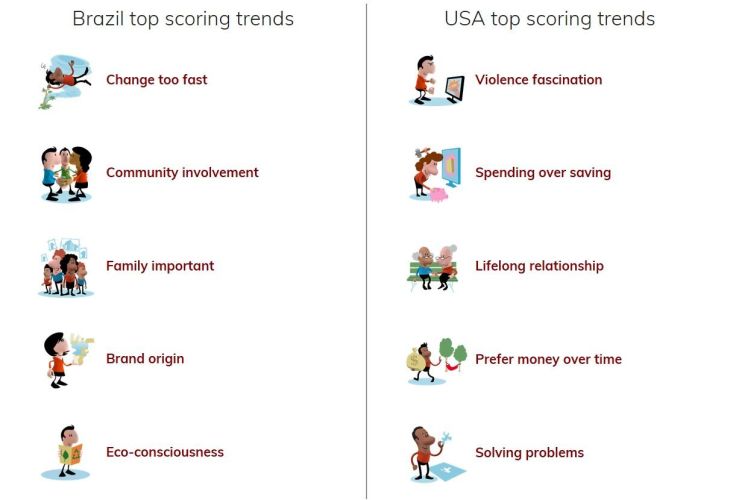Gen-Z Music Fans Explained, a Values Based Perspective
According to IFPI, the music industry is currently experiencing a healthy growth rate, led by Latin America (+16.8%) and followed by North America (+14%), Asia and Australasia (+11.7%), and Europe (+0.1%). Brazil (+15.4%) and the US (+14%) have the strongest growth in Latin America and North America, respectively.
Further, Gen Z currently consumes music the most in nearly all markets and is highly exposed to international music artists. Thereby, many assume that Gen Z music fans around the globe may have similar profiles. To demystify this, we aim to explore whether Gen Z music fans differ from one country to another by looking at their core values and music preferences. For this article, we use our cross-cultural data to compare Gen Z (18-24 years old) music fans from Brazil (n = 295) and their counterparts from the US (n = 438).

How do you connect with people from different backgrounds?
Socio-Cultural Trends

Source: 2019 Glocalities Data, Social Cultural Trends of young people (18-24 years old) in Brazil (n=438) and USA (n=295).
We first look at socio-cultural trends, which are the values adopted during people’s formative life phase. Community involvement and Family important score relatively high among Brazilian Gen Z music fans. This suggests that they may be interested in group-oriented activities more often. On top of that, they are more into the stories behind a brand. That, in turn, offers opportunities to record labels or artists to showcase their “behind the scene”. In contrast, American Gen Z music fans tend to be short-term oriented and materialistic. Spending over saving and Prefer money over time are good examples. Interestingly, they also value lifelong relationship relatively more.
Music Preferences
Turning to their music preferences, Brazilian Gen Z music fans like electronic and gospel music relatively more. They are also more likely to have dancing as their hobby/interest. These aspects are in line with the popularity of group-oriented activities among the Brazilian’s. While their American counterparts find pop and hip-hop music relatively more appeal. It is worth noting that materialism is to a large extent portrayed in the hip-hop music videos. This shows that one’s socio-cultural values are hand in hand with one’s music preferences.

We can conclude that there are clear differences between Brazilian Gen Z music fans and American Gen Z music fans in the Glocalities database in terms of socio-cultural values and music preferences. This implies that the music industry shall adapt its marketing strategies towards its target audiences in different country-markets. That, in turn, results in optimized customer engagement and eventually sustained business growth.
This is just one of the many ways that the World of Glocalities App enables us to understand cultural values and compare them to each other. See the demo video here bellow.
The database contains many more variables that make it possible to obtain a 360-view of a market or specific group based on a given topic. Do you have a specific question about a country or target audience? We will be glad to help you, so do not hesitate to contact us!


